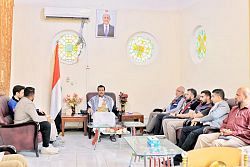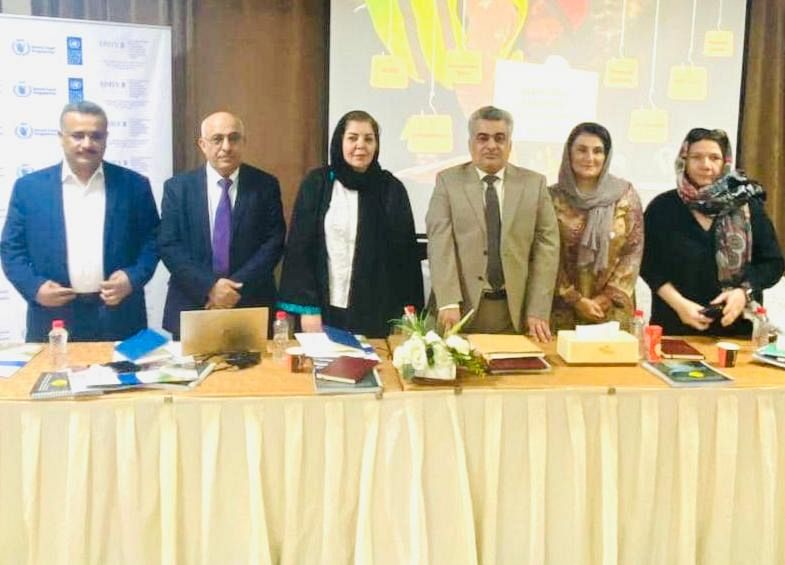
Marib Deputy Governor Discusses Humanitarian Interventions with Turkish Associations
Deputy Governor of Marib Abd-Rabu Miftah met Sunday with a delegation from the Turkish associations “Deniz Feneri” and “Al-Khair,” headed by Ufuk Khan Diyar.

Kuwait Condemns Iranian Attack Targeting Its Territory
The State of Kuwait has strongly condemned a “heinous Iranian attack” that targeted its territory on Saturday morning, calling it a flagrant violation of Kuwait’s sovereignty, airspace, international law, and the Charter of the United Nations.

Korea large companies' exports rise 10 percent
Large companies' exports in South Korea rose approximately 10 percent year-on-year in the fourth quarter of last year, driven by increased global demand for semiconductors.

Saudi League: Al-Nassr, Al-Ettifaq and Neom Secure Victories Over Al-Ittihad, Damac and Al-Riyadh
Al-Nassr defeated its guest Al-Ittihad 2–0 in the match that brought them together at Al-Awwal Park Stadium in Riyadh, as part of the 21st round of the Saudi Professional League.
Last Update: ،
2026/03/01
Time
10:35:11
Latest News:
 Cabinet approves draft budget for fiscal year 2026
Cabinet approves draft budget for fiscal year 2026
 Finance Minister signs with Ambassador al-Jaber new Saudi support agreement for Yemen
Finance Minister signs with Ambassador al-Jaber new Saudi support agreement for Yemen
 Prime Minister Receives Letter from Italian Deputy Prime Minister
Prime Minister Receives Letter from Italian Deputy Prime Minister
 Yemen Strongly Condemns Blatant Iranian Attacks on Saudi Arabia
Yemen Strongly Condemns Blatant Iranian Attacks on Saudi Arabia
 Republic of Yemen Condemns Iranian Attacks on Several Sisterly States
Republic of Yemen Condemns Iranian Attacks on Several Sisterly States
Latest News:
 Cabinet approves draft budget for fiscal year 2026
Cabinet approves draft budget for fiscal year 2026
 Finance Minister signs with Ambassador al-Jaber new Saudi support agreement for Yemen
Finance Minister signs with Ambassador al-Jaber new Saudi support agreement for Yemen
 Prime Minister Receives Letter from Italian Deputy Prime Minister
Prime Minister Receives Letter from Italian Deputy Prime Minister
 Yemen Strongly Condemns Blatant Iranian Attacks on Saudi Arabia
Yemen Strongly Condemns Blatant Iranian Attacks on Saudi Arabia
 Republic of Yemen Condemns Iranian Attacks on Several Sisterly States
Republic of Yemen Condemns Iranian Attacks on Several Sisterly States
Project Steering Committee for Livelihoods Support, Food Security held meeting
[28/02/2024 02:20]
ADEN-SABA
The Project Steering Committee for Livelihoods Support, Food Security, and Climate Adaptation in Yemen (Phase III) held its meeting here on Wednesday.
The meeting was chaired by Deputy Minister of Planning and International Cooperation Dr. Nizar Basuhayb to discuss the implementation of the project funded by the European Union and implemented by the Swedish International Development Cooperation Agency (SIDA) with the support from the United Nations agencies.
Dr. Basuhayb emphasized the importance of the project as one of the economic empowerment initiatives that contribute to improving food security, supporting small farmers, reducing malnutrition, mitigating climate change risks, and serving as a distinguished model for livelihood projects and employment opportunities for farmers.
He also highlighted the project's role in increasing agricultural productivity, empowering youth and women to own agricultural assets, and enhancing technical and vocational skills in rural areas.
Furthermore, Dr. Basuhayb reaffirmed the government's commitment to addressing the economic and livelihood conditions, providing basic services and supporting the agricultural and fisheries sectors in partnership with donors and Yemen's development partners.
He discussed the structural and emerging challenges facing development in Yemen in general, and the agricultural sector in particular, such as water resource scarcity, low agricultural productivity, heavy reliance on food imports (up to 90%), the impact of war and conflict, and Yemen's vulnerability to climate change.
He commended the level of strategic partnership with the European Union and its significant contributions in supporting Yemen in various vital areas, particularly livelihoods, agriculture, food security, women's empowerment, human rights and sustainable peace.
He stressed that the Ministry of Planning prioritizes the agricultural sector and food security in mobilizing external funding to contribute to reducing food insecurity and alleviating the humanitarian crisis affecting 80% of the population. He also highlighted that the agricultural sector contributes for around 20% of the gross domestic product and employs over 60% of the workforce.
For her part, Nadia al-Awamleh, the Deputy Resident Representative of the United Nations Development Program (UNDP), emphasized the economic and social importance of the project and the efforts of UNDP in supporting development in Yemen and transferring from relief to development.
The Project Steering Committee for Livelihoods Support, Food Security, and Climate Adaptation in Yemen (Phase III) held its meeting here on Wednesday.
The meeting was chaired by Deputy Minister of Planning and International Cooperation Dr. Nizar Basuhayb to discuss the implementation of the project funded by the European Union and implemented by the Swedish International Development Cooperation Agency (SIDA) with the support from the United Nations agencies.
Dr. Basuhayb emphasized the importance of the project as one of the economic empowerment initiatives that contribute to improving food security, supporting small farmers, reducing malnutrition, mitigating climate change risks, and serving as a distinguished model for livelihood projects and employment opportunities for farmers.
He also highlighted the project's role in increasing agricultural productivity, empowering youth and women to own agricultural assets, and enhancing technical and vocational skills in rural areas.
Furthermore, Dr. Basuhayb reaffirmed the government's commitment to addressing the economic and livelihood conditions, providing basic services and supporting the agricultural and fisheries sectors in partnership with donors and Yemen's development partners.
He discussed the structural and emerging challenges facing development in Yemen in general, and the agricultural sector in particular, such as water resource scarcity, low agricultural productivity, heavy reliance on food imports (up to 90%), the impact of war and conflict, and Yemen's vulnerability to climate change.
He commended the level of strategic partnership with the European Union and its significant contributions in supporting Yemen in various vital areas, particularly livelihoods, agriculture, food security, women's empowerment, human rights and sustainable peace.
He stressed that the Ministry of Planning prioritizes the agricultural sector and food security in mobilizing external funding to contribute to reducing food insecurity and alleviating the humanitarian crisis affecting 80% of the population. He also highlighted that the agricultural sector contributes for around 20% of the gross domestic product and employs over 60% of the workforce.
For her part, Nadia al-Awamleh, the Deputy Resident Representative of the United Nations Development Program (UNDP), emphasized the economic and social importance of the project and the efforts of UNDP in supporting development in Yemen and transferring from relief to development.
Key words:
Furthermore - implementation - Representative - International - contributions - vulnerability - distinguished - opportunities - government's - productivity - Marib Deputy Governor Discusses Humanitarian Interventions with Turkish Associations
Marib Deputy Governor Discusses Humanitarian Interventions with Turkish Associations  Cabinet approves draft budget for fiscal year 2026
Cabinet approves draft budget for fiscal year 2026 Finance Minister signs with Ambassador al-Jaber new Saudi support agreement for Yemen
Finance Minister signs with Ambassador al-Jaber new Saudi support agreement for Yemen Prime Minister Receives Letter from Italian Deputy Prime Minister
Prime Minister Receives Letter from Italian Deputy Prime Minister  Yemen Strongly Condemns Blatant Iranian Attacks on Saudi Arabia
Yemen Strongly Condemns Blatant Iranian Attacks on Saudi Arabia  Republic of Yemen Condemns Iranian Attacks on Several Sisterly States
Republic of Yemen Condemns Iranian Attacks on Several Sisterly States Prime Minister Receives Letter from UNESCO Director-General
Prime Minister Receives Letter from UNESCO Director-General Ambassador of Yemen Meets Indonesian Coordinating Minister for Legal Affairs, Human Rights
Ambassador of Yemen Meets Indonesian Coordinating Minister for Legal Affairs, Human Rights International Association (Al-Ameen) Provides over 9,000 Medical Services During January 2026
International Association (Al-Ameen) Provides over 9,000 Medical Services During January 2026 President al-Alimi Congratulates Dominican Republic on its Independence Anniversary
President al-Alimi Congratulates Dominican Republic on its Independence Anniversary


